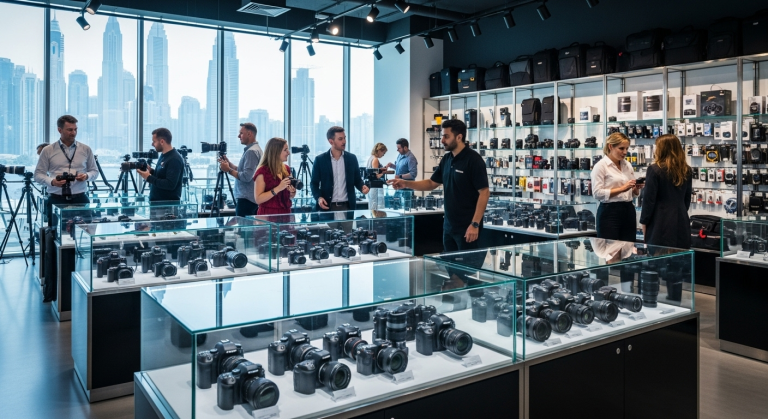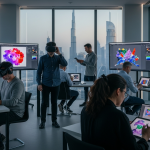Market Analysis and Opportunities
The United Arab Emirates, and Dubai in particular, has rapidly established itself as a regional hub for commerce, tourism, culture, and technology. Against this dynamic backdrop, the demand for professional photography equipment continues to grow—driven by booming events sectors, thriving e-commerce, rising social media usage, creative industries, and the region’s international appeal. This analysis investigates the business opportunity presented by a Professional photography equipment store in Dubai, providing actionable insight for entrepreneurs, investors, and business managers seeking to unlock the potential of the UAE business environment.
Target Market Analysis
- Market Size and Growth: According to various industry sources, the UAE’s photographic and imaging industry has witnessed steady growth, propelled by the strong market for events (such as EXPO 2020 legacy developments), tourism, and an expanding pool of content creators and influencers. Dubai’s annual influx of over 15 million tourists (Department of Economy and Tourism, Dubai, 2023), and a surging creative sector valued at over AED 37.25 billion in GDP contribution, underlines robust demand.
- Growth Rate: The global photography equipment market is expected to grow at a CAGR of 4.2% from 2023 to 2028 (Market Research Future), with the UAE outpacing many markets due to its status as a creative hub.
- Consumer Behavior: Dubai’s audience—comprised of professional photographers, media agencies, corporations, artists, influencers, and serious hobbyists—demands the latest technologies, authentic brands, and after-sales support (workshops, repairs, rentals). Price sensitivity is moderate, but quality and availability are paramount.
- Key Trends:
- Digital transformation and online purchasing.
- Preference for one-stop shops offering value-added services (rentals, studio spaces, equipment demonstrations, training).
- Increasing demand for sustainable, energy-efficient, and ethically sourced products.
Marketing Needs and Recommended Tactics
- Strategic digital campaigns: Robust SEO, targeted PPC advertising focused on keywords like “photography equipment Dubai,” “camera store UAE,” and “professional camera rental” will drive high-intent traffic.
- Social media content: Engaging Instagram and TikTok presence showcasing products, client portfolios, and tutorial content to tap into Dubai’s influencer-savvy market.
- Brand-building activities: Partnering with event organizers, creative hubs, and photography schools to build credibility and community ties.
- Localized market research: Gathering regular insights on buying behavior to inform merchandising, pricing, and logistics decisions.
Expansion Potential
- Market Entry: Opportunities abound to serve secondary Emirates (Abu Dhabi, Sharjah) and wider GCC markets, leveraging Dubai’s logistics advantage.
- Scalability: The business can diversify into B2B (serving media agencies, corporate clients) or B2C (online sales, education, workshops), and tap into export markets using Dubai’s trade infrastructure.
Comprehensive Business Overview
A Professional photography equipment store in Dubai operates within the retail and services domain, specializing in the sale and support of high-end cameras, lenses, lighting, drones, accessories, and related gear. Core revenues derive from retail sales, rentals, workshops, and after-sales support.
Target Audience:
- Professional photographers and filmmakers
- Event production houses and studios
- Content creators, vloggers, and influencers
- Corporate media departments
- Photography enthusiasts and hobbyists
Mission:
To be Dubai’s premier destination for comprehensive professional photography solutions, delivering unmatched value, expertise, and after-sales support.
Vision:
To support the UAE’s creative economy by empowering visual storytellers and enterprises with world-class equipment, training, and community engagement.
Core Objectives:
- Offer a wide portfolio of leading international brands and innovative products
- Provide exceptional customer service, technical support, and educational resources
- Foster partnerships with agencies, events, and creative platforms
- Scale operations to become the region’s leading photography support hub
Business Stage & Location:
Depending on resource allocation and licensing preferences, the business can launch in a Dubai Mainland location (ideal for retail visibility), or a Free Zone (such as Dubai Media City) to maximize operating advantages for creative sector businesses.
Competitive Advantage
Entrepreneur’s Perspective
- Viability derives from a large, underserved market of creative professionals and businesses seeking reliable, locally-based suppliers. The founder can leverage advanced product knowledge, supplier relationships, and personalized service to win loyalty.
- Dubai’s tax-friendly status and world-class logistics make it a launching pad for regional expansion, reducing startup and ongoing operational costs versus other global cities.
Investor’s Perspective
- Attractive ROI prospects due to steady demand, high-value transactions (camera/lens purchases often range from AED 5,000–25,000 per client), and value-added services (repairs, rentals, training) that generate repeat business.
- Scalable business model with potential for franchising, e-commerce, and vertical integration (private label accessories, bundled services).
- First-mover or early-mover advantage in a market where imported goods face quality control and distribution delays—local presence fosters client trust and ongoing engagement.
Manager’s Perspective
- Operational control enabled via streamlined supply chains, ERP integration, and proximity to decision-makers in Dubai’s events and creative sectors.
- Access to free zone benefits (100% foreign ownership, simplified company setup, support services) or robust retail infrastructure in the Mainland, with each offering unique management efficiencies.
Special Strengths
- Exclusive distributor rights or brand partnerships with global photography brands.
- Proprietary technology for inventory, rentals, or B2B ordering platforms—enabling efficient, customized service.
- Regular workshops, events, or masterclasses to foster brand loyalty and community engagement.
Financial and Investment Needs
Financial Requirements
- Startup Capital Estimate: AED 800,000–1,200,000 (initial stock, retail buildout, basic operations).
- Cost Breakdown:
- Infrastructure (retail showroom + storage): AED 250,000–400,000
- Initial inventory: AED 400,000–600,000
- Licensing (DED or Free Zone): AED 25,000–60,000
- Staffing: AED 80,000–120,000 (first 3–6 months)
- Marketing and digital setup: AED 50,000–100,000
- Working capital: AED 50,000–100,000
Investment Potential
The store is an attractive option for equity investors or debt funding partners, given:
- High market demand and strong potential for repeat business
- Possibility to leverage existing networks and local expertise (investment consulting services can facilitate optimal funding models)
- Moderate risk compared to tech startups—predictable input/output costs and measurable performance
Preferred investment structures could include:
- Equity partnerships (for growth capital or franchising)
- Revenue-sharing agreements (with established media groups)
- Traditional bank or fintech lending (secured by inventory or accounts receivable)
Financial Risks and Mitigation
- Cash Flow: Manageable via staggered stock purchases, flexible supplier terms, and robust pre-order or leasing models.
- Currency Fluctuations: Minimized by transacting in AED and utilizing local distributors for international brands.
- High Setup Costs: Offset by staged investments and diversified revenue streams (rentals, services, online sales).
- Insurance: Comprehensive coverage for stock, liability, events, and cyber risk is advised.
Human Resources and Recruitment
Workforce Requirements
- Store Manager
- Sales and Product Specialists (2–3)
- Technical Support/Repair Expert
- Online Marketing & E-commerce Specialist
- Logistics/Inventory Coordinator
Critical skills include technical product knowledge, bilingual communication (English/Arabic; other languages a plus), digital marketing, and customer service orientation.
HR Challenges and Solutions
- Talent Attraction: The UAE labor market is competitive for tech-savvy sales and technical staff. Offer above-market compensation, incentive structures, and career progression plans.
- Retention: Continuous professional development, product certification programs, and positive workplace culture are essential.
- Training: Partner with manufacturers for in-depth product training and regular skill upgrades.
Compliance with UAE Labor Laws
- Adhere to UAE labor regulations: offer formal contracts, health insurance, end-of-service benefits, and meet all visa and residency requirements for expatriate staff.
- Implement robust HR systems or partner with a PRO (Public Relations Officer) service to ensure compliance with changing regulations.
Infrastructure and Operations
Infrastructure Needs
- Physical Retail: Ideally situated in a high-traffic commercial or creative cluster (e.g., Dubai Media City for B2B, Business Bay for B2C).
- Digital Infrastructure: E-commerce-enabled website, cloud-based inventory management, customer CRM platform.
- Cost-effective Solutions: Utilize co-working spaces for admin/marketing teams, Free Zone retail units to reduce cost and speed setup, virtual office options for remote sales or support roles.
Operational Optimization
- Invest in ERP and inventory systems for real-time, accurate stock tracking and order management.
- Adopt lean processes for procurement, sales, repairs, and returns to minimize bottlenecks and reduce operating expenses.
- Establish strong relationships with reliable logistics partners for efficient inbound/outbound shipping.
Legal Compliance
- Register the company with the Department of Economic Development (DED) or an appropriate Free Zone authority.
- Secure all required retail, trade, and import/export licenses.
- Open a corporate bank account—ensure proper KYC/AML documentation.
- Consult business setup services to navigate regulatory requirements and streamline the process.
Innovation and Technology
- Pursue partnerships with tech brands for early access to new releases, demos, and co-marketing initiatives.
- Embrace digital tools such as augmented reality (for virtual product trials), remote consultations, and AI-powered support chatbots to enhance client experience.
- Regularly review emerging hardware and software trends to ensure up-to-date inventory and service offerings.
Marketing and Branding Strategies
Brand Status
- Brand awareness is typically built through consistent, high-quality products and expert service delivery.
- Visual identity should reflect professionalism, innovation, and Dubai’s cosmopolitan flair.
- Areas for Improvement: Continuous investment in content (tutorials, testimonials), social proof, and engagement with the local creative community.
Marketing Channels
- Digital: SEO-optimized website, Google Ads, and active social media marketing.
- Traditional: Print ads in creative industry publications, presence at trade shows, and in-store promotions.
- Optimization: Monitor channel ROI and adjust spend to focus on high-performing platforms. Foster partnerships with influencers to amplify reach—see Persian Horizon’s services for professional campaign management.
360-Degree Campaigns
- Launch multi-channel campaigns tied to major events (Dubai Shopping Festival, Art Dubai), integrating social, in-store, and email marketing.
- Host or sponsor creative competitions, workshops, and product launches to build excitement and engagement with target audiences.
- Build an email subscriber list for regular product updates, educational content, and exclusive offers.
Growth and Development Potential
Growth Strategies
- Market Expansion: Franchising the store model across other UAE cities or within the GCC region.
- Sales Growth: Launching niche verticals (e.g., drone technology, studio lighting) and exclusive promotional packages.
- Strategic Partnerships: Collaborating with hotel chains, event venues, or tourism boards for B2B sales channels.
Networking
- Networks with leading brands, local business councils, and government entities (for incentive programs) are essential. Leverage industry events and Dubai Chamber resources.
- Explore international networks, such as the Persian Horizon 57-country platform, to source products or access export markets—read more at their news section.
International Potential
- Dubai’s logistics, legal, and tax advantages make it the ideal base for regional and global exports, enabled by world-class sea and air connectivity.
- The business can attract customers from the wider MENA region—and beyond—by offering international shipping and after-sales support.
Sustainability and Innovation
- Adopt eco-friendly packaging, efficient logistics, and responsible disposal/recycling of old equipment to align with Dubai Vision 2030.
- Support local talent and sustainability-focused photography events or workshops, positioning the business as an industry leader in responsible growth.
Alignment with Dubai’s Market
Cultural Alignment
- Dubai’s multicultural population expects service in multiple languages, culturally respectful marketing, and a diverse team—this inclusivity should be built into recruitment and communications.
- Product selection should reflect global brands and offerings popular among Western, Arab, and Asian clients.
Local Regulatory Compliance
- Ensure adherence to all commercial, tax, and labor laws. Partner with legal and HR consultants for periodic compliance reviews.
- If gaps are identified, act quickly to obtain regulatory approvals, update contracts, or adjust tax reporting procedures.
Advantages of Dubai
- Zero percent corporate and personal income tax for most business activities.
- Access to sophisticated free zone and logistics infrastructure, world-class transportation, and a massive skilled labor pool.
- Gateway status to wider GCC, African, and Asian markets provides long-term growth leverage for ambitious store operators.
Local Challenges and Solutions
- High Competition: Distinguish via specialized services, rapid product access, and deep community engagement.
- Operational Costs: Mitigate through careful site selection, inventory management, and cost-sharing (co-working, outsourcing non-core functions).
- Import Restrictions/Delays: Partner with established UAE distributors, and utilize free zone benefits for streamlined imports.
Conclusion and Actionable Recommendations
A Professional photography equipment store in Dubai presents a compelling business in Dubai, situated at the intersection of a flourishing creative economy, robust technological adoption, and world-class infrastructure. By prioritizing customer-centric services, digital transformation, and effective operational strategies, the business can capture sustained market share and deliver strong returns.
Key Action Points:
- Leverage Dubai’s unique market and logistics advantages to pursue scalable growth.
- Invest in robust marketing, digital infrastructure, and team development to build a market-leading brand.
- Ensure rigorous compliance, sustainability, and innovation to align with Dubai’s vision and regulatory requirements.
- Consider tapping into professional business setup services and investment consulting for seamless business launch, expansion, and cross-border growth.
For further insights and personalized support for investment in the UAE, entrepreneurs and managers are encouraged to visit Persian Horizon or consult their blog for ongoing market analysis in Dubai and tailored business solutions. Seize the opportunity to build your legacy in Dubai’s vibrant creative marketplace.







